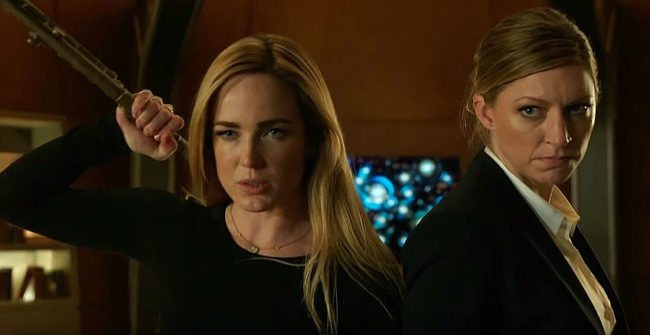A couple weeks ago I had a conversation with some other Legends of Tomorrow fans about #Avalance and how much we loved what Caity Lotz and Jes Macallan were doing with their characters. It was one of many similar conversations I’ve had since that ship set sail (and many Sara specific conversations before that). As with most of them, we all said how grateful we are for these characters and characters like them and that we wish we’d had them when we were kids. As usual, I added how happy I was that my young nieces have characters, images, and stories like these because I didn’t, and I definitely needed them.
Growing up I understood being straight and I understood being gay. That was about it. Any other ways of being or identifying didn’t even start to enter my lexicon until college, some not until grad school. For a long time, I assumed because I had feelings for men I must be straight. I dismissed any feelings I had about women and bought into certain tropes about intimacy between women to explain them away. It seemed easier, at the time, to make myself fit into boxes I already understood. The culture around me was encouraging me to do that too, both in the media I consumed and with my peers in everyday life. It was that second point that made my recent #Avalance conversation a little different from the other ones. As we all agreed how important it was to have these characters so that LGBTQA+ kids could see themselves represented, I started thinking about the one memory I had of talking about bisexuality with friends as a teenager.

The one and only time I can remember bisexuality even being mentioned before college was when a friend tried to joke that bisexuals “were just greedy.” At the time I was so far from asking myself any questions about my own sexuality that I didn’t take it personally, but it stuck with me. I wouldn’t go as far as to say that specific incident impacted my own process of coming out but that idea he was reflecting about bisexuals certainly did. I unknowingly internalized that negation and it almost certainly kept me from thinking about and acknowledging my own feelings, even after I started understanding sexuality and gender in ways that weren’t binary. Whatever impact that specific interaction had on me, it was enough to leave some sort of a mark. It’s one of my most vivid memories of a friendship that started in 8th grade and lasted through college. I’d never thought too deeply about why he said it before, but this time I did. I’m almost positive that if I had come out to him then he would have been supportive. I can’t say for certain if he would have changed his thinking beyond accepting me, but I tend to think he would have. I’m not even sure how much he actually believed what he said and how much of it was “just a joke.” Whatever his feelings truly were, at that moment he was articulating a culture that shaped him in the same way that it had shaped me. The culture that told me what I felt wasn’t real, told him the same thing. We learned the same lesson it just meant different things for each of us. For me, it meant believing that a part of myself was not legitimate for a long time and carrying that weight into adulthood. For him, it was permission to dismiss bisexuality and treat it as a punchline. If it wasn’t a real thing he wasn’t actually hurting anyone, right? Maybe if he had the stories and characters I wish I’d had it would have been different for him too. Maybe a Sara Lance on his screen could have helped him see people and build empathy. This time when I thought about what characters like Sara Lance would have meant when I was growing up it wasn’t just about seeing myself. It was about him and friends like him seeing me too.
I’m grateful my nieces will grow up with characters like Sara, or like Clark Griffin, Bo Dennis, Nico Minoru, Wonder Woman, Waverly Earp, and Rosa Diaz and I want them to have even more. I want TV, movies, books, and comics to keep pushing to tell more stories about Trans characters, queer characters of color, asexual characters and non-binary character. I want to see it all because maybe my nieces will need those characters the way I needed them. To give them confidence and examples to help them figure out who they are and make it easier for them to understand what they feel. But maybe they won’t. Instead, maybe growing up with all these stories will help them be the people that make coming out feel safe and empowering for a friend. Maybe it will help them be the people that say “I see you” so someone else feels less alone. Whoever they are and whoever they become, my nieces need these stories. Every kid out there does. Characters like Sara Lance matter because stories matter. They inform how we understand the world and the people in it. We need to see ourselves reflected in them but we all need to see others reflected too.
